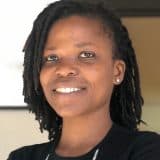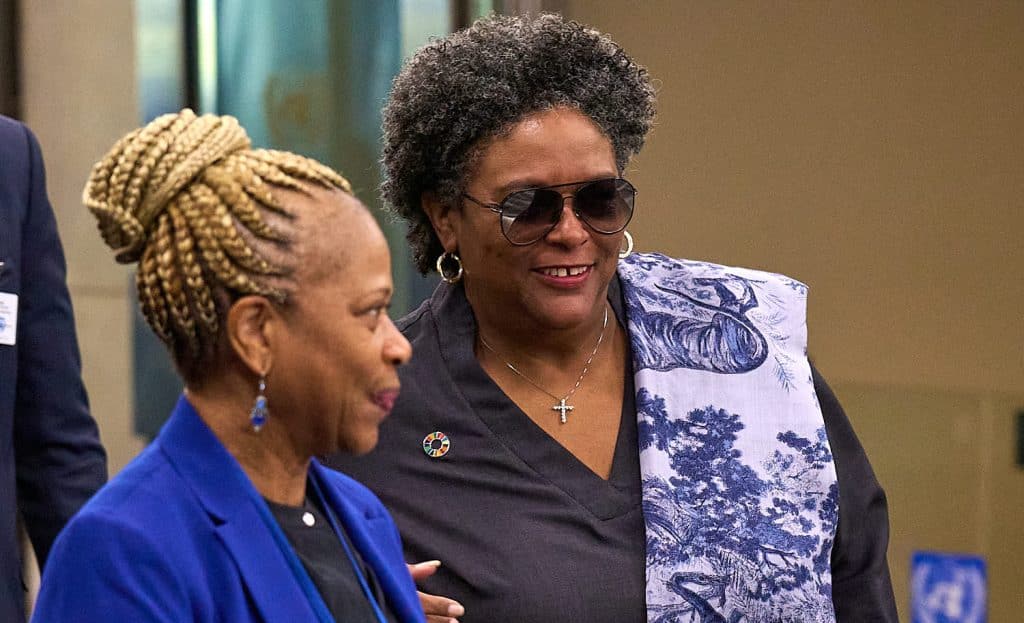
Barbados: The Time for Reparative Justice Has Come —
Prime Minister of Barbados Mia Amor Mottley said that reparative justice is inevitable for countries that suffered the horrendous consequences of the trans-Atlantic slave trade to develop economically. She made this pronouncement in her speech at the General Assembly on Friday.
“Reparative justice is a solemn obligation which we must confront,” Mottley said. “[Reparative justice] is a conversation whose time has come. It can’t be a slow conversation taken up when people feel like it. It has to be a conversation in which equal partners discuss, it cannot be an act of charity of those who feel their conscience must be cleansed.”
Ghanaian President Nana Akufo-Addo echoed the sentiment in his Assembly speech on Sept 21. Akufo-Addo said that both Europe and the United States have been unwilling to confront the dire results of the slave trade of centuries ago, noting that it is time to prioritize the conversation. “No amount of money will ever make up for the horrors,” Akufo-Addo said, “but it would make a point that evil was perpetuated and millions of active Africans were snatched from our continent and put to work in America and the Caribbean without compensation for their labor.”
At #UNGA, I called on Ghanaian Reggae artiste Rocky Dawuni’s music and asked, “How many roads we had to walk, just to make it to the door only to be told we were too late?”
Time is short. Yes we’ve made progress. But we must act now to ensure we aren’t too late to save tomorrow. pic.twitter.com/R3lw9lTnxw
— Mia Amor Mottley (@miaamormottley) September 22, 2023
Mottley said that Barbados planned to raise the matter with the European Union last year but paused the process because of Russia’s full onslaught of war in Ukraine, which began in February 2022. She said that her country and the European Union were ready to restart the discussion. (Mottley is rumored to be a contender for UN secretary-general for the five-year term beginning in 2027.)
She also called for urgent implementation of the Sustainable Development Goals, noting that the UN and developed countries must swiftly address the climate crisis, wars and food insecurity. “Are we going to be too late for the SDGs that are really the promise of development?” she asked. The UN must wake up to its responsibility of “saving the world” by taking proactive steps in dealing with the major crises that affect the planet while instituting its own reform. “Vision without action, as Nelson Mandela told us, is just a dream,” she said. “Action without vision just passes the time, but vision with action can change the world.” — DAMILOLA BANJO
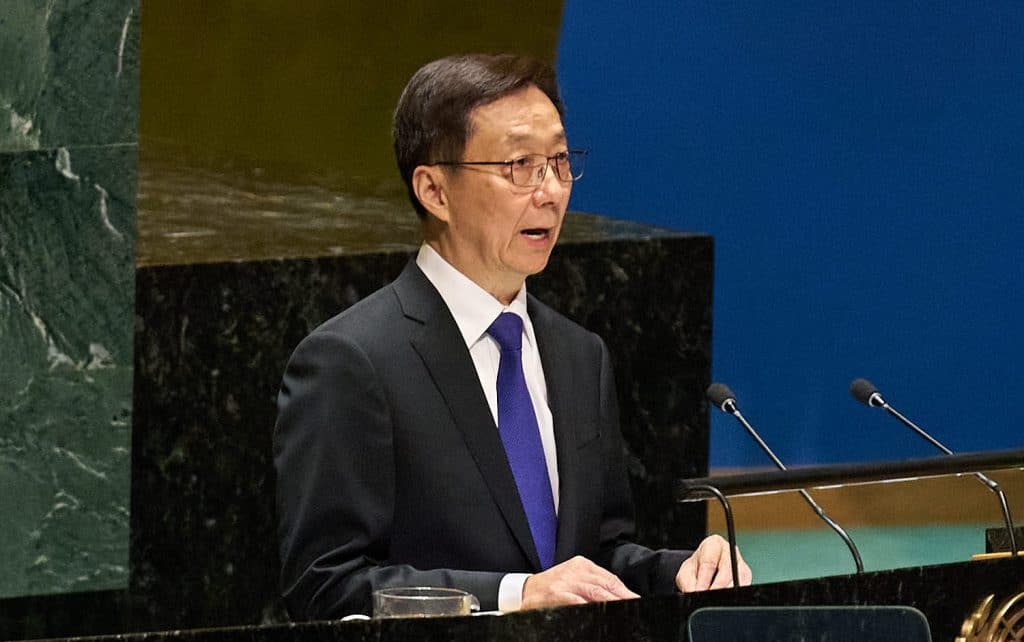
China’s Stark Contradictions on Human Rights for the World vs. at Home
China called for advancing human rights through dialogue in its speech at the 78th session of the United Nations General Assembly. Yet days earlier, the Chinese mission to the UN tried to quash an event discussing the continued marginalization of the minority Muslim Uyghur community in the Xinjiang region.
You might be interested in these posts.
“Promoting and protecting human rights is a cause pursued by all countries and ensuring a good life for people is the biggest human right,” said Han Zheng, China’s vice president, on Sept. 21. “We should advance the international human rights course through dialogue and cooperation and oppose politicization and double standards, especially the use of human rights and democracy as a political tool to interfere in the affairs of other countries.” (China is a permanent member of the UN Security Council; President Xi Jinping has not appeared in person at the annual UN General Assembly debate since 2015.)
On Sept. 19, the Atlantic Council gathered independent experts and foreign diplomats on the sidelines of the annual General Assembly conference to re-examine “international action after the UN’s Uyghur report.” The Chinese mission to the UN, which is led by Ambassador Zhang Jun, tried to stop the Council event by asking other UN missions to shun the gathering, describing it as an “anti-China event.” Beth Van Schaack, the American ambassador at large for global criminal justice, who attended the meeting, described China’s attempt as “transnational repression.”
The UN Office of the High Commissioner for Human Rights’ report last year on Xinjiang accused the Chinese government of severe human rights violations against the Uyghurs, saying it committed grave systematic and widespread abuses in the province and that Chinese authorities’ actions “may constitute international crimes, in particular, crimes against humanity.”
In a letter obtained by the National Review, the Chinese mission said the Xinjiang issues were not about human rights but “about countering violent terrorism, radicalization, and separatism.”
Speaking at the Atlantic Council meeting, Sophie Richardson, the China director for Human Rights Watch, said that any government that would go to such lengths to stop a dialogue “has no business sitting on the U.N. Human Rights Council.” (China’s membership ends in December.)
In his speech, Vice President Zheng called on the UN to promote “security, development and human rights” as a path to a “common prosperity.” His country, he added, was committed to an “independent foreign policy.”
“No matter what stage of development [China] reaches, China will never practice hegemony and expansion,” he said. “China will uphold the common values of humanity, that is peace, development, equity, justice, democracy, and freedom, and continue to advance peaceful, open, cooperative development.” — DAMILOLA BANJO
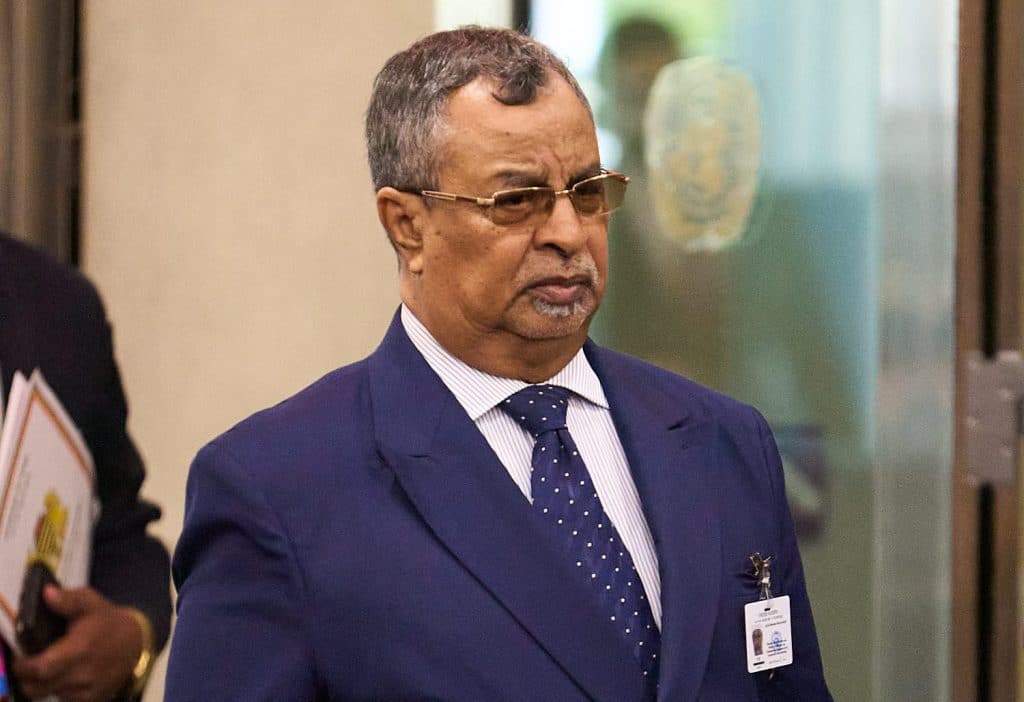



Fragile Chad Absorbs a Whopping 400,000 Refugees Since April
In his speech at the 78th General Assembly debate on Thursday, Mahamat Saleh Annadif, Chad’s foreign minister, stressed the importance of his country in assisting the humanitarian catastrophe caused by neighboring Sudan’s sudden civil war.
“We have taken in more than 400,000 new refugees, in addition to the 600,000 refugees that are that are already living in Chad, who have been living with us for several years,” Annadif, a former head of the UN peacekeeping mission in Mali, said on Sept. 21. “In addition to this, there are refugees coming from our neighboring countries and elsewhere. Thus, of a population of 17 million, almost 2 million are refugees. This is a great burden for Chad. My country calls for rapid, coordinated and comprehensive action on behalf of the entire international community to address this humanitarian disaster.”
With the Egyptian government’s June decision requiring all Sudanese to have visas to enter the country, Egypt has shut down asylum for the hundreds of thousands of Sudanese refugees who have been seeking haven since the war in their country exploded in April. Chad has therefore welcomed the largest number of Sudanese refugees of any country since the two generals in Sudan began fighting each other five months ago. Western countries have counted on Chad, a landlocked country with severely limited financial resources, to welcome refugees to avoid even-greater humanitarian and security problems in the already-insecure region.
Chad plunged into its own fragile political situation after its longtime military strongman, Idriss Déby Itno, was killed while fighting rebels on the frontline in northern Chad in 2021. Déby’s son Mahamat Idriss Déby Itno took power in a coup d’état after his father’s death, and initially he agreed to an 18-month political transition before holding elections. In October 2022, however, his government delayed the transition for another two years. International powers like France, a main ally of Chad, backed Déby’s plan despite opposition protests in N’Djamena, the capital.
On Sept. 18, the country held a high-level meeting on the sidelines of the annual General Assembly conclave. The session was titled “The Journey Towards Constitutional Order: Challenges and Perspectives,” and was presided over by UN Deputy Secretary-General Amina Mohammed. Chad was represented by Annadif and Moussa Batraki, the country’s minister of economic planning and international partnerships, who told the diplomats present that the country needed $260 million to hold elections and that it was “the last stable state in the region” of western Sahel.
For years, some political analysts and journalists have pointed out the double standards that the Chadian government seems to enjoy, despite being run by an authoritarian family dynasty for the last 33 years. Indeed, Déby has reneged on his promise to hold elections within 18 months after his coup while receiving endorsements of his rule by France and the United States. At the same time, those countries have harshly criticized other military governments in the region.
“How must Chad’s beleaguered opposition feel about the UN’s unflinching endorsement of the sham political process underway there?” mused Cameron Hudson, a senior associate at the Center for Strategic and International Studies, on X/Twitter. — DULCIE LEIMBACH
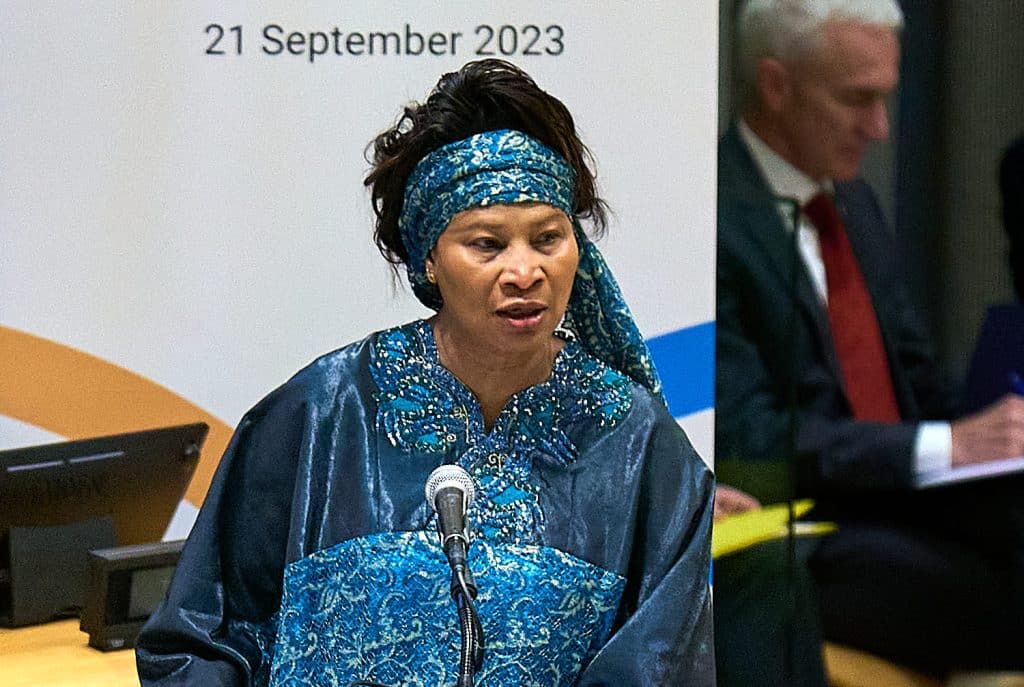



At the Run-Up to the Summit of the Future, Russia and the West Sling Arrows
The Summit of the Future scheduled for September 2024 held one of its many preambles on Thursday, with a low-energy ministerial meeting in which Russia, Cuba and Western countries took their predictable shots across the bow, signaling that the actual summit a year from now could hit brick walls.
Notably, the gathering on Sept. 21 was somewhat indistinguishable from the “high-level dialogue on financing for development” presented the day before. But attendance was lower at the Sept. 21 meeting, and at least 10 delegations were not in the room when their names were called, having to cycle in later in the day.
In the words of the UN, the Summit of the Future “is a once-in-a-generation opportunity to enhance cooperation on critical challenges and address gaps in global governance,” as well as staying focused on the Sustainable Development Goals and the United Nations Charter and moving toward “a reinvigorated multilateral system that is better positioned to positively impact people’s lives.” (It was originally planned to take place during this week’s high-level forum of the General Assembly.)
For the most part, countries — largely represented by foreign ministers — reiterated the goals of next year’s summit. The day read like a stilted competition shuffling through a bullet-point list, but in the diplomats’ own words.
Yet with “multilateralism” included in the subtitle for the prep meeting, some countries went to core issues with that premise as well as the problems within the UN itself, particularly the Security Council’s limitations in numbers (15 permanent and nonpermanent members in total) and the veto.
Cuba, speaking for the Group of 77 and China by Minister of Foreign Affairs Bruno Eduardo Rodríguez Parrilla, insisted that threats to multilateralism emanated from powerhouses in the UN, without naming names. Speaking to “the right to live free of hunger and free of poverty as a priority for developing countries,” he affirmed that “the path to this noble purpose is unquestionably related to the change in the current international order, which is unjust and exclusionary.” The G77 plus China issued a statement in February criticizing the lead-up process to the summit, making a list of demands. Key among them is that negotiations for the Pact for the Future, the outcome document of the summit, be transparent and inclusive rather than, as the G77 suggest, has been otherwise.
While many representatives refrained from talking about Russia, a few countries named Moscow’s aggression in Ukraine as an obstacle to talking about a peaceful, secure future. Ian Borg, foreign minister of Malta, said, “We might even ask ourselves is there even a future to deal with.” Japan added that “Russia must withdraw its troops immediately and unconditionally from Ukraine.”
Russia spoke later in the meeting, and while not replying directly to the above assertions, Foreign Minister Sergey Lavrov pushed disarmament talks off this particular table and complained of the West’s use of a “green agenda as an additional tool for neo-colonial enslavement of the Global South.” After referring to “respect for the sovereign equality of states,” Lavrov warned: “We caution against the temptation to turn the Future Summit into an arena for pitting ‘democracies’ against ‘autocracies,’” adding that “signs of the UN Secretariat’s compliance with this confrontational concept are alarming.”
Truly inclusive multilateral future-building must ensure the survival of developing countries, Foreign Minister NP Saud of Nepal and the current chair of the Group of Least Developed Countries pointed out. “The global governance and financial system must not be prisoner of the past,” he said, echoing the call for financial global reform often heard this week. It remains to be seen if developed countries will be committed to taking these measures.
The youth activist Varaidzo (Vee) Kativhu spoke early on, pleading: “We want to see major and dramatic change in how you engage with us. Please stop talking about us and start talking to us.” Many ministers called for including youth, but Kativhu was the sole speaker from the demographic. The summit’s modalities create space for youth leaders to speak, but most of the 2024 conference will be dominated by heads of state. And the Pact for the Future will be agreed on by consensus through intergovernmental negotiations ahead of the summit, which could weaken the effect of all speeches on the big day. — MARIA LUISA GAMBALE
Damilola Banjo is a staff reporter for PassBlue. She has a master’s of science degree from the Columbia University Graduate School of Journalism and a B.A. in communications and language arts from the University of Ibadan, Nigeria. She has worked as a producer for NPR’s WAFE station in Charlotte, N.C.; for the BBC as an investigative journalist; and as a staff investigative reporter for Sahara Reporters Media.
This post was originally published on this site be sure to check out more of their content.




